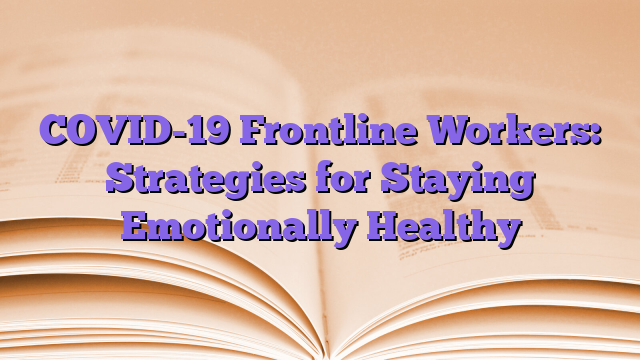
To date, there have been more than 3 million people worldwide infected with COVID-19, over two hundred thousand deaths and millions of others affected financially and emotionally. Our frontline workers are tasked with continuing to go to work to care for our public health and safety needs. During this unprecedented pandemic, frontline workers and medical workers are trying to take care of their patients and the general public while coping with their own physical exhaustion, stress, worries and fears. Below are some mental health tips, strategies, and resources for staying emotionally healthy.
PHYSICAL HEALTH:
EAT REGULARLY – With a heavy workload, variable work schedules and mental exhaustion, it’s very easy to skip a meal. Sometimes you might be too tired to cook and prefer to catch up on your sleep. If you don’t have the time or energy to cook, consider meal prep, buy a healthy meal to go, or choose healthy frozen meals. While takeout and frozen foods might not be your first choice, they can be a better alternative for skipping meals or craving unhealthy snacks.
MOVE! – Even if you can’t go to the gym or exercise with your workout buddies, consider doing some physical activity at home, like yoga, stretching, push-ups, hand weights, or workout videos.
MEDICATION – Don’t forget to take your medication if it’s prescribed for you. Set reminder alarms or sticky notes so you don’t miss a dose.
TEMPERATURE TEST:
Don’t forget to assess yourself daily! How do you deal with your stress? Do you feel more distant or closed? Do you tend to be irritable or easily irritated? Have you started self-isolating or not answering calls or texts? Do you feel overwhelmed or have you lost control? Do you cry or do you feel down? If you have any of the above problems, don’t hesitate to talk to someone and get help.
REMOVE:
Stand back and breathe. Depending on the work needs, it can be very difficult to stop and press the reset button. However, being able to temporarily unplug is important to allow your body and mind to rest. Try not to constantly talk about work during your breaks or over lunch. When you are at home, give your full attention to your family and engage in bonding activities to rejuvenate your mind and soul. Consider engaging in meditation, spiritual, or religious activities depending on your beliefs.
BUDDY CHECK-IN:
Even though you may be fine, that doesn’t mean your co-workers are managing their stressors effectively. Look around! As you walk down the hall, pass an open office door, or have a conversation in the staff lounge, take a close look. Watch out for unexpected negative changes in appearance, hygiene, attitude, or mood in your co-workers. Consider doing a quick buddy check by asking them how they’re doing. While they may not open at this time, remind them that help and resources are available.
HUMAN RESOURCES:
Employers are encouraged to provide their employees with information about available resources, including employee assistance programs, mental health providers, and financial assistance. Consider highlighting available resources through continuous reminders on the company’s website, weekly emails, Facebook posts, or informative bulletin boards.
NORMALIZE HELP-SEEKING BEHAVIOR:
While getting help is important, there are still sociological and cultural stigmas associated with it. Everyone can do their part to normalize the search for psychological help. As a society, we don’t think twice when a person talks about going to their doctor for a medical problem. However, we all need to be careful about how we react or comment when a person is stressed, overwhelmed, or having trouble coping. Let’s make sure we don’t make fools of ourselves, use negative language, gossip, or downplay the person’s difficulties. Instead, be that voice of encouragement and empowerment!
Remember, asking for help isn’t a sign of weakness, it’s a sign of courage!
RESOURCES:
• National Suicide Prevention Lifeline: 1-800-273-TALK (8255)
• The Crisis Textline: Text TALK to 741741
• NAMI Helpline: 1-800-950-NAMI (1-800-950-6264)
• Disaster Emergency Hotline: 1-800-985-5990
• Dial 211—visit 211.org for help finding groceries, paying housing bills, accessing free child care or other essential services.
• Military OneSource: Provides materials and information about military parenting programs.
Telephone numbers:
Toll-free: 1-800-342-9647
En español lame al: 1-800-342-9647
TTY/TTD: Dial 711 and quote toll-free 1-800-342-9647
• Veterans Crisis Line (VA): Call 800-273-8255 or text 838255
• DoD/VA Suicide Outreach:
• InTheRooms.com: Live AA/NA online meetings
SMARTPHONE APPS FOR MENTAL HEALTH:
forward app
Life Armor app
Breathe2Relax app
Headspace (meditation app)
Insight Timer app
Copyright © Felecia D. Sheffield, PhD, HSP,. All rights reserved in all media.
Thanks to Felecia Sheffield PhD
